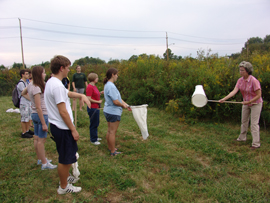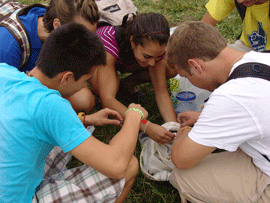by Katie Bonanno
This summer, as an incoming Honors material culture preservation major envisioning my first semester at the University of Delaware, I never imagined that I would spend it collecting insect samples, watching birds, counting plants, or learning to effectively teach middle school students. However, my first-year Honors colloquium, “Students of Our Environment,” taught by Professor Sue Barton, gives me the unique opportunity to experience each of these activities in rapid succession.
Clearly, the colloquium demands a wide range of expertise; lessons are taught by Dr. Barton, plant and soil sciences; Dr. Hough-Goldstein, entomology and wildlife ecology; Dr. Shriver, entomology and wildlife ecology; and Dr. Ford, elementary education. This course not only expertly encapsulates the interdisciplinary intention of Honors colloquia – “Students of Our Environment” combines environmental science, education techniques, and challenging writing assignments – but it also has brought to light one of the most pressing issues of our generation: nature-deficit disorder.
 The course was formulated on the premise that people have lost their connection with nature, much to their disadvantage. This condition has been called “nature-deficit disorder” by Richard Louv, author of Last Child in the Woods. In order to encourage society’s re-immersion in nature, the culminating project for the class is to create a middle school curriculum that gets children interested in nature, hence the projects our class has completed thus far.
The course was formulated on the premise that people have lost their connection with nature, much to their disadvantage. This condition has been called “nature-deficit disorder” by Richard Louv, author of Last Child in the Woods. In order to encourage society’s re-immersion in nature, the culminating project for the class is to create a middle school curriculum that gets children interested in nature, hence the projects our class has completed thus far.
The University of Delaware houses five environmental study sites: a suburban landscape, a corn field, a wetland, a meadow, and a woodlot. From each of the sites, we have collected insects, counted plants, and observed birds; we are currently in the process of analyzing our data and writing research reports. However, the class also emphasizes our personal connections with nature, and we have read, discussed, and written reflection papers on different aspects of this connection.
Above all, “Students of Our Environment” is a hands-on course. In order to experience firsthand what it is like to teach young children about nature, our class traveled to NorthBay Adventure Camp, an environmental center located about forty minutes from campus in North East, Maryland. Through collaboration with NorthBay’s Dean of Educators, Mary Reichley, our class was able to shadow different groups of students and their NorthBay educators, learning about ways to present nature and science to groups of students in an engaging and effective manner. Each group of students focused on different subject matter, ranging from vultures to clams, yet all of the educators approached the material in an appealing and functional fashion. Ideally, the techniques we learned at NorthBay will be applied to our own curricula, which will work to combat nature-deficit disorder in society today.
Trips like my class’ excursion to NorthBay Adventure Camp add substantially to the splendid and enriching experience of the Honors Program’s first-year Honors colloquia. As I near the end of my first semester at the University of Delaware, I maintain that I never expected to take a class like “Students of Our Environment.” However, I consider myself lucky to have been given the opportunity to experience a class where discussions, lecture, hands-on activity, and a culminating community outreach project simultaneously, seamlessly come into play.





